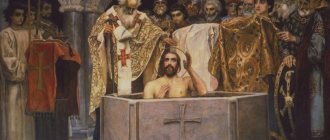Is there evidence of the truth of Orthodoxy?
– There are many religions in In each of them there are people who are sincerely confident in the truth of their religion. If we take as a postulate that the Orthodox religion is true, this automatically means that most of all other religions are lies, and some religions are simply Satanism! And the most correct way is to quickly run and get baptized. But for this we need indisputable evidence that Orthodoxy is the truth. And from this the question arises: does this evidence exist?
Archpriest Konstantin Parkhomenko answers the question.
– I do not dare to call any religion that teaches about God satanic. There are satanic directions, but this is a completely separate story. These religions are God-hating, totalitarian sects, commercial enterprises that were created to manipulate the consciousness of people and receive money from them.
In general, I will not call any traditional religion that teaches about the Lord demonic or satanic. I will say that these religions are the fruit of human quests.
What is the difference between Christianity and other religions. All other religions: Hinduism, Islam, Buddhism, other religions are an attempt by the human mind, the human soul, the spirit, to comprehend the mystery of God. We cannot know God, prove it physically, chemically. Maybe the Lord will give us some hints. Now scientists are talking about the multidimensionality of the universe and some other interesting things. Physicists discuss such a concept as the anthropic principle - as if there is an intelligent principle behind our cosmos, as if our cosmos was created by some infinitely wise creator. We don't touch them.
But we still feel God inside. We understand that man is not an animal. We can say that man originated from animals. But man cannot be reduced to an animal. Man is something else, not earthly, alien. The Bible describes that man is the image of God, similar to God. Like strives for like, we feel like we are like God. Those. a person internally feels the truth of the fact that there is a God in that other world, and a person tries to describe this to himself. He is trying to find his way to God. All religious quests are quests of the religious spirit. This is man's search for God.
Christianity is fundamentally different. This is not a human quest, this is a revelation of God. Christianity is about God coming to man. God says: you searched, and in some ways you were not mistaken, but in others you were mistaken. You are great for searching, but I brought you the last and absolute true news about God.
Father Alexander Me has a wonderful sermon. This is the last sermon-lecture of Father Alexander on the eve of his death, it is called “Christianity”. Read it. It says that Christianity amazingly shows us the best of other religions. Let's say Islam teaches about the unity of God, and Christianity teaches that God is one. Hinduism speaks of polytheism, i.e. conveys some kind of human idea that God is not reducible to one eternity. God is One, say Christians, but He is threefold in persons. Buddhism says that God is everywhere in every point of the universe. And Christianity says that God, with his Divine energies, is present everywhere. These human attempts have something true. In each of these religions the truth shined forth. Because this is based on a true attempt by the human soul and mind to comprehend God and the other world. But these are all amateurish, human attempts.
And Christianity is the highest revelation of God. Whether we believe in it or not is another question. If you don't believe me, I can't tell them anything. If a person, Muslim or Jew, impartially studies how Christianity arose, he will be convinced that it is not a human construct. And at the heart of this is the divine Revelation that came to us in Jesus Christ. He lived with us, and the fact that He was from God was proven in an unusual way - death on the cross and resurrection from the dead, which was simply a revolution, completely changing the world.
If we take other religions - Buddhism, Islam, then we see a sincere person, the Prophet Muhammad or Buddha, they reflected, thought and created this system. So do others. But these people of other religions did not resurrect. The truth of Christianity is proven by the resurrection of Christ. Was it, you say? I recommend reading to those who do not believe the book by Nicholas Thomas Wright, “The Resurrection of the Son of God,” which certainly proves the reality of the resurrection of Christ.
All other human searches are not declared satanic or false, they are simply human attempts, and Christianity is not a human, but a Divine revelation.
Why Orthodoxy and not Catholicism or Protestantism? Because every person who objectively and impartially studies Christianity will agree that Orthodoxy is the successor to the apostolic faith. Orthodoxy is the tradition from Christ and the apostles that has survived to this day. Orthodoxy has not changed anything in the faith handed down to us by the apostles and holy fathers. We haven't changed anything. But Catholicism began to change. Every year Catholic theologians convert to Orthodoxy. Real major theologians come to the conclusion that yes, Catholicism is a modified version of apostolic Christianity. So we need to return to the original. There is nothing to say about Protestantism. It arose from protest to Catholicism. There are many directions of Protestantism, all of them change some basic parameters of the apostolic church.
We call ourselves one apostolic church. The Orthodox Church, despite the shortcomings of the church members, despite the fact that we, having this truth, humiliate it, wallow in the mud - despite all this - has kept this faith intact. What is the importance of maintaining intact faith? The Holy Fathers said that the Orthodox faith also affirms a full mystical life; thanks to the preserved true faith, we have the surest road to the Lord, the road to achieving human holiness, cleansing the soul from passions, becoming like God, which is the task of every Christian. The Christian path is a person's direct, marked path to the Kingdom of Heaven. There are problems with this in Catholicism and Protestantism. It is difficult to call their religion a full-fledged true apostolic Christianity.
Why is it impossible to unite all religions?
What is Christianity and what is its essence?
Christianity is the most widespread and numerous world religion. Every third inhabitant of the planet considers himself to be one of them.
In short, a Christian is one who believes:
– into one omnipotent God, who exists in three persons: Father, Son and Holy Spirit;
- in Jesus Christ - God the Son, who was born of the Virgin Mary and the Holy Spirit, died for human sins on the cross, was resurrected, ascended to heaven and will come again to judge the living and the dead and reign forever;
- into a single apostolic church;
- in baptism, cleansing from sins;
- to the general resurrection of the dead and new eternal life.
Why did Christianity become a world religion?
Initially it was one of many sects of another faith - the Jewish. Moreover, the Jews lived under the rule of the Roman Empire, which was polytheistic and pagan. Christianity managed not only to survive in this “cauldron”, but also to attract millions of people of other faiths, because it:
– made no distinctions between nations, classes and promised to unite everyone in a single brotherhood;
– without great difficulties adapted to the traditions and rituals of different peoples;
– his supporters were firm in faith and high morals;
– During persecution, Christians often became heroic martyrs.
Moreover, by the time of the advent of Christianity, a clear gap had emerged and was widening between the demands of the Jewish faith and the deeds of its leaders.
In Rome, it began to spread during the decline of Roman culture. And when the Roman Emperor Constantine and his successors adopted Christianity, you understand...
Where did Christianity first become the state religion?
Armenia became the first Christian country in the world. This happened around the year 301, after Bartholomew and Thaddeus, two of the 12 apostles of Jesus, began preaching in the Armenian kingdom.
How does Christianity relate to believers of other religions, and even to non-believers?
Christianity has a long and controversial history. There were times when it was established by the cross and the sword, and those suspicious were burned at the stake. Agree, against the backdrop of the biblical statements “thou shalt not kill” and “love even your enemies” this looked strange.
For a true Christian, it does not matter whether another person is rich or poor, what race, nationality, beliefs, views he is - everyone is worthy of love and sympathy. If a Christian knows the real way of healing, salvation from sins, his duty is to try to help benevolently, without irritation or hostility. Yes, argue, defend your faith, but at the same time hear the other and remain generous and patient.
Why doesn't Christianity seek unification with other religions? After all, every faith has something useful, but there is only one God...
Imagine you wanted apples, tomatoes, lilacs and potatoes to grow on one tree. Pieces of different plants can be somehow held together, but they will not become a single organism. There are profound differences between them - in the set of genes. Merging is only possible if these sets are completely rebuilt.
So, in world religions there are provisions that are incompatible with each other. To unite, say, Christianity and Buddhism, it is necessary that one or both of these religions abandon all of their main principles. But why is this necessary?
In addition, many want unification, trying to make their lives easier. So as not to think about what faith and why to choose for yourself. To sit during a long church service (like Catholics) and not stand (like Orthodox). And so on. But should the path “up” be simple and easy?
How do other religions evaluate the person of Christ?
For Orthodox Jews, it was as if Jesus did not exist at all. Only one volume of the Talmud tells about a certain attacker Yeshua from Nazareth (Nazareth), who posed as a messiah - God's messenger.
His sermons made it possible to violate all Jewish commandments. After his death, a new religion arose, founded by Yeshua. But supporters of the religious movement of Jewish Christians (there are also such) consider Jesus to be the Jewish messiah, sent by God to save humanity. By the way, the name “Yeshua” means “savior.”
In the Koran, Jesus is named 25 times. Here his name is Isa ibn Maryam (son of Mary) al-Masih (messiah). Muslims revere him as a messenger of Allah, a prophet and preacher, a miracle worker and the founder of a new religion. It was based on the commandments of the Prophet Musa (Moses) and remained the only true one until the appearance of the Prophet Muhammad.
Jesus, the Koran says, was not executed, Allah took him alive to heaven. Isa will return on the eve of Judgment Day and will become a participant in the final battle with the forces of evil.
Orthodoxy is Christianity
Orthodox Christianity is a Church that preserves intact the truth revealed to the apostles of Jesus Christ, dating back to the time of the Resurrection of the Savior, without changing the teaching of the faith of the apostles. The canonical point of view, Christianity and Orthodoxy are synonymous.
Orthodox Christianity is a Church that preserves intact the truth revealed to the apostles of Jesus Christ, dating back to the time of the Resurrection of the Savior, without changing the teaching of the faith of the apostles. The canonical point of view, Christianity and Orthodoxy are synonymous.
If we return to the origins of Christianity, then it was the true, pure and true truth, brought to earth for the salvation of people to Christ the Savior; it is kept in all the purity and integrity of the true teaching of Christ about faith and piety (that is, life by faith),
And only over time, from the true faith, which is now called Orthodoxy, branches began to emerge: Catholicism, Protestantism and others
Some heresies and schisms that threatened to undermine from within and save for people the power of Christ in the area, imitating the truth of lies.
To expose and condemn these heresies, false teachings and schisms, the guardians of the Divine Truth, the successors of the Apostles, the Bishops began to come to Councils - local and Ecumenical, in order for the universal “bribes of the mind” to understand and enlighten once and for all the mandatory and unchangeable teaching of the Church for all Christians. So, here is the true Christian faith - the right faith, in contrast to heresies and sects, which is also “Christian” in itself, and was renamed “Orthodox”.
- Orthodoxy, in contrast to Catholic and Protestant Christianity, is characterized by the magnificent decoration and clothing of priests, as well as the wearing of priests; the degree of worship varies;
- Orthodox Christians place the cross from right to left, the papal assembly is the opposite;
- Catholic Christians church services are accompanied by the sound of an organ, unlike Orthodoxy, where you can only listen to singing without music.
Orthodox ministers, unlike other religions in Christendom, are excellent. During an Orthodox service, candles are lit by the priest. He's not used to playing music. The members of the fingers were baptized, gathered into a thumb in twos, and currently in threes). Orthodox crosses are placed from right to left and placed on the belt.
Orthodox Christians believe that their church originates from the crucifixion and resurrection of Christ. Rus' became Christian in 988; baptism truly belongs to the spiritual tradition of Byzantium.
The Christian tradition preaches the eternal salvation of souls after the death of the body. Throughout their earthly life, believers must serve God and conduct their behavior in accordance with His commandments. Orthodox Christians did not mutter about trials or even joy for them. Despair is considered one of the deadly sins.
Christians are followers of the Christian religion, belonging to any conventional Christianity of Orthodoxy, Catholicism or Protestantism with its various SECT often sectarian nature. Orthodox Christians, a worldview consistent with the ethnic heritage of the tradition associated with the Orthodox Church.









